Laibach Interview
21 Jun 2024Do you view yourselves as (unofficial) ambassadors of Slovenia?
Since we have recently been awarded by the Slovenian president with the National Order of Merit of the Republic of Slovenia, we should probably consider ourselves first of all as official State Artists, but we are also happy to act as ambassadors if Slovenia wants and needs us as such. How difficult can that be?
On a related note, how do you describe Slovenia (to audiences, or just people you meet) when you're abroad?
We usually explain that Slovenia is the ‘nation with the best location’, closer to Venice than most of Italy and as well closer to Vienna than a good half of Austria.
Trbovlje, your home town, is just the kind of place that In Your Pocket readers would find interesting on a day trip. [Industrial tourism has actually become a pretty trendy genre of tourism in Europe in recent years]. Any recommendations for things to see and do there?
In Trbovlje, where Laibach was founded in 1980, tourists should definitely visit the architectural modernist cultural pearl - the Delavski dom cultural centre, built in 1956 to the designs of architects Marko Župančič and Oton Gaspari, where we were forbidden to perform back in 1980, but are performing regularly today. On the façade of this monumental building, you can find a magnificent mosaic by sculptor Marij Pregelj, which, influenced by Greek and Egyptian aesthetics, depicts proletarian life in Trbovlje. In the surroundings of Delavski dom, there are sculptures of the important social-modernist sculptor Stojan Batič, also from Trbovlje, who strongly influenced the aesthetics of Laibach, including a monument depicting the historical struggle of the miners against Orjuna (the Organisation of Yugoslav Nationalists). The 'Ajnzer' is one of the main entrances to the extinct Trbovlje mines, and next to it stands the legendary miners' bathroom or 'Vashhava'. Also worth a visit is the highest chimney in Europe, built next to the Trbovlje II Thermal Power Plant, where Laibach performed twice, in 1990 and 1992. They can stop by the 2001 Space Odyssey Monolith, installed in the centre of town, in the Park of Culture, and finally, they should climb the highest peak in Zasavje, the picturesque Mt. Kum, where Laibach usually collectively prepare for European and world tours.
In Ljubljana?
Ljubljana is a beautiful city, full of striking views and beautiful sights. From Laibach's point of view, all the points set and designed by the architect Jože Plečnik are greatly important and worth a visit. But also the buildings by architects Vurnik and Fabiani and others. Laibach's Ljubljana base was the design school in Križanke, situated by Napoleon Square, which was visited by several members of the group. Laibach also gave many concerts in the Križanke auditorium - the former monastery of the German Knights of the Teutonic monastic order, who chose the cross as their symbol. Opposite the Križanke is Plečnik's NUK - the National and University Library, a building that still fascinates with its unique architecture. Ljubljana’s Castle is also a place where Laibach performed several times, most recently twice during the Corona period. On the opposite hill is the MGLC - the International Graphic and Fine Arts Centre, where we had a major retrospective exhibition of our visual art back in 2010. Behind the MGLC is the Švicarija building, where we used to have a small studio. On the way out of the centre and along the Plečnik's or Jakopič promenade to the MGLC, a stop at the Moderna gallery, also a unique architectural gem, is a must. A little further on in Tivoli Park was once the Tivoli Studio, where Laibach recorded their 1986 album Opus Dei. A stone's throw further on is Hala Tivoli, where important artists and bands from the world music scene performed between the 60s and the 90s, including Queen, Tina Turner, Frank Zappa, David Bowie, Nirvana and many others, also Laibach a few times. Another admirable building is Ljubljana's Nebotičnik, which was once the tallest building in the Balkans and was home to a jazz and strip club in the 1970s. Laibach used to organise parties on top of Nebotičnik. Another remarkable spot in Ljubljana is Rožnik, where NSK members gathered in the late 1980s and early 1990s for long meetings, and where we discussed our strategy very seriously. And let's not forget the Union Café, where Ljubljana's alternative scene was socially very active in the vibrant 1980s. The same goes for the ŠKUC Gallery in old Ljubljana, where history was made and where Laibach had several key exhibitions in the early 80s. And there is, of course, Slovenia's largest cultural centre, Cankarjev dom, where Laibach also held some of its most important concerts.
And elsewhere in Slovenia? Any off-the-beaten-path recommendations you give people visiting for the first time?
Uh, this is really tough; all of Slovenia is a gem and we want to keep some of it for ourselves – therefore no recommendations. They should discover Slovenia on their own, best by foot or by bicycle. Or by helicopter.
What about unusual/interesting concert venues in Ljubljana or elsewhere in the country?
We have always tried to perform in unusual venues whenever possible. We have performed in quarries, twice in the old Trbovlje Thermal Power Plant, three times in the Velenje mine, 200 metres underground, in front of the Museum of Modern Art and in Tivoli Park, on the plateau in front of the MGLC. And God knows where else. Ljubljana and Slovenia have a number of high-quality and very interesting concert venues, starting with the series of unique venues at Metelkova mesto.
Could a project like yours - ie an avant-garde industrial rock band with very specific themes and aesthetics - be started, and be so successful, today?
Maybe not a project like Laibach, but we are still alive and well, so there is no need for another Laibach. Yet.
What have been the biggest changes over the years in the industry?
Algorithms.
Is it easier to reach potential fans these days?
Yes and no; algorithms dictate their own rules, which are very rigid, authoritarian and inflexible. A band can reach a limited audience very quickly, but it can also stay only with a limited audience, not moving anywhere further. Or it can drop out of the game very quickly.
You of course gained a lot of international notoriety in 2015 with your North Korea shows. Now almost a decade later, how do you view the experience?
We still miss North Korea and would love to return soon! This is a unique country that keeps many secrets to itself only. We feel much richer since we were there.
About your shows in North Korea, Žižek said ‘You will not learn a lot from Laibach about North Korea. You will learn a lot about our own anxieties and hypocrisies’. Do you think we've actually learned anything over the past decade? And if not, will we ever?
Not really and it won't happen ever.
All right, let's end on a lighter note here. Anywhere in the world where you've never played a show, but would still love to one day?
Bhutan, Japan, Iraq, Iran, Syria, Palestine, Saudi Arabia, Uzbekistan, Kazakhstan, Turkmenistan, Kyrgyzstan, Tajikistan, all of Africa, South America, India, Afghanistan, Laos, Cambodia, Albania...
Favourite part of touring?
The end.
And least favourite?
The end.
Any favourite venues to play, which our concert-going readers might want to add to their bucket lists?
Every next one. On the last tour, we performed in a really beautiful venue CKK Jordan in Torun, Poland. That one was definitely a tour winner.
Any cities you always look forward to visiting on tour? For any specific reasons (eg food, people, etc)?
We love cities and people everywhere, but we generally prefer those within the Eastern Hemisphere.
When you're not touring, where do you like to spend your (summer) holidays?
On remote islands, hills and lakes or rivers in Slovenia and around.
For some of our readers, this might be their first introduction to Laibach (and even NSK), any recommendations for what they should read/listen to/watch next if they're interested?
They should start with the book 'Laibach – 40 Years of Eternity', followed by 'Gesamtkunstwerk Laibach' and 'Laibach Kunst-Machine', for dig into NSK they should check the book 'NSK – From Kapital to Capital' and see the film on Laibach 'Victory Under the Sun' (by Goran Gajić) and 'Predictions of Fire' by Michael Benson. And they should listen to a 'LAIBACH REVISITED' Box, and 'Opus Dei Revisited album, as well as an 'Introduction to Laibach' compilation.
Any up and coming bands from Slovenia (or the wider region) we should check out?
The music scene in Slovenia is currently very vibrant and of very high quality, so it is difficult to highlight just a few names. Unfortunately, we don't really know any super fresh new bands, but if we have to single out any of the existing younger artists, be it the playful MRFY, the ever-charming Koala Voice, the incredible Masayah, Širom, Matter...
And lastly, any interest in helping us set up Pyongyang In Your Pocket? No need to answer now, you can think about it ;)
We’d be absolutely happy to help you, Pyongyang will always be in our hearts and may it be as well in our pockets!


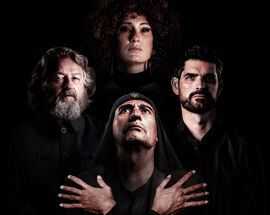
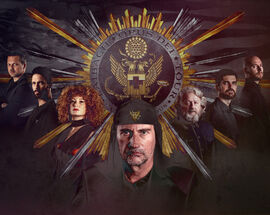
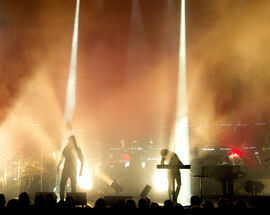
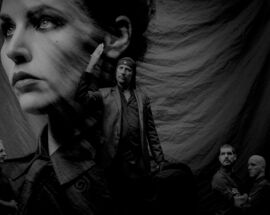
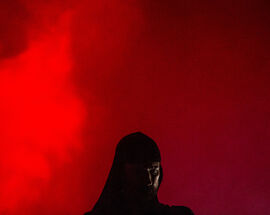
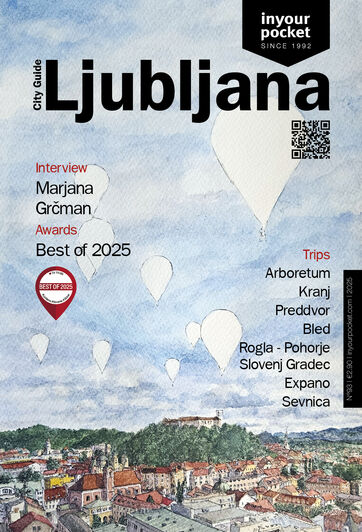


Comments